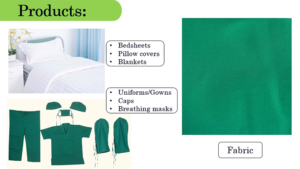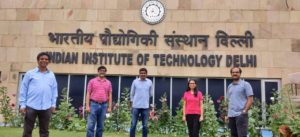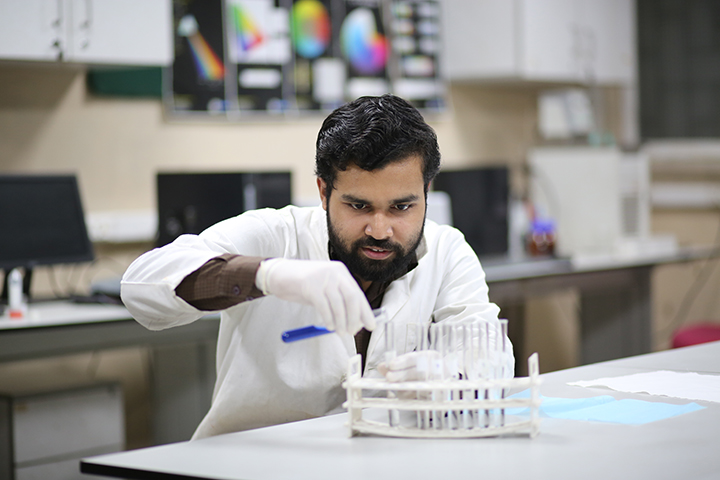IIT Delhi’s teams have been working tirelessly to innovate products that can contribute to the fight against Coronavirus
From anti-bacterial fabric to cheaper testing kits, IIT Delhi’s teams have been on the job to contribute to the fight against Coronavirus that has overshadowed just about everything else in our world. They have on hand 28 projects on diagnostics, therapeutics and support equipment like personal protective equipment (PPEs) and ventilators, which has till now generated Rs 3.5 crore by way of funds.
Most of the work, though, is in its development stage, and teams are tight-lipped about just how the mass market will be benefited from these inventions. There are patents to be applied for, companies to be taken on board and inventions like anti-bacterial fabric which could be one of the biggest winners coming out of IIT-D.
Called Fabiosys innovations, it is the product of Yatee Gupta, mentored by Prof. Samrat Mukhopadhyay. The target of this product is to prevent hospital-acquired infections, essentially making them safer. The fabrics that have been developed would be able to kill 99.9% of the pathogens in 1-2 hours.
“What is interesting about the developed fabric is that, even after washing multiple times it does not lose its functionality,” the summary shared with us says. “This fabric can be stitched into various articles like bedsheets, uniforms for patients, doctors and nurses, curtains, among others. Fabiosys has done the multiple washing and found the fabric to meet Indian washing standards. The fabric is also completely non-toxic and affordable.” It is currently awaiting a patent.
Hospitals in Delhi treating Covid-19 patients, have seen a high number of medical staff getting infected with the virus. At Lok Nayak Hospital, 83 medical staff tested positive for Covid-19 by the end of May.
At Ram Manohar Lohia Hospital, 81 medical staff tested positive, and the All India Institute of Medical Sciences saw a whopping 480 Covid-19 positive medical staffers. Much earlier, at least 100 medical workers at the Delhi Government-run Dr Baba Saheb Ambedkar (BSA) Hospital, in West Delhi’s Rohini area, tested positive for Coronavirus.
To ensure minimal risk of infection when treating patients with Covid-19, staff needs to have the all essential personal protective equipment (PPE) which includes a gown, gloves, and either an N95 respirator plus a face shield/goggle or a powered, air-purifying respirator (PAPR).
And while masks like the N95 would filter out airborne particles and tiny droplets that an Covid-19 positive patient may have released, contamination from their gowns, or other protective gear and even surfaces is high.

Gupta says their goal is to make PPEs (Coveralls) and other Infection-proof products from the fabrics, especially for healthcare applications and use in hospitals in the present pandemic situation. And with the textiles killing 99.9% of the pathogens in 1-2 hours, it would be an added protection for the high-risk medical staff.
Currently, hospitals are reeling under the pressure of the pandemic which has killed a total of 514,628 worldwide, out of 10,614,903 positive cases. In India alone we have seen a total of 5,87,092, as of July 1, with 17,417 deaths. A day before, Delhi saw 2,199 new Covid-19 cases and 62 deaths, taking the total number of cases to 87,360 including 5,834 recovered/discharged/migrated cases, 26,270 active cases and 2,742 deaths. Yet there are allegations that healthcare workers are not even receiving the much-needed PPE kits.
Earlier we had spoken to nurses from Dr Ambedkar hospital who told us supply of PPE kits had been limited during the initial part of the crisis. Now, however, they are being supplied with enough of the critical protection. However, this may not be true for all hospitals.
A plea by Distress Management Collective made to the Delhi High Court in mid-June heard allegations that nurses in private hospitals were not being provided proper protection equipment to guard against Covid-19 infection. The High Court was later told by the Centre that they had provided PPE kits and N95 masks to states and union territories as per their requirement and it was up to them to “optimally utilise” the protective gear.
And while the government has put a cap on how much hospitals can charge – like in Delhi hospitals for an isolation bed, no more than Rs 8,000-10,000, and no more than Rs 15,000 limit for ICU beds without ventilators and Rs 15,000-Rs 18,000 for ICU beds with invasive or non-invasive ventilator support – PPE kits is something hospitals are seeing lumping the money on.
A report by India Spend quoted a family being charged Rs 10,000 per day for the personal protective equipment (PPE) worn by medical staff treating the Covid-19 positive family member. In the end they were made to pay Rs 2.9 lakh for PPE, 18% of their total bill.
So perhaps innovations like that of IIT-D which hopes to bring down the costs of PPE coveralls would make hospitals stock up on these essentials, and not charge patients exorbitant amounts.
The IIT-D team which has developed the affordable PPE coverall, includes integrated body suit and shoe cover.
Dr SM Ishtiaque, Professor Emeritus, Department of Textile and Fibre Engineering, IIT Delhi and his student, Dr Biswa Ranjan Das, Scientist ‘D’ & Assistant Director, DMSRDE (DRDO), Kanpur, says that the PPE coverall meets the criteria specified by the Ministry of Health and Family Welfare, Government of India. And it specifically points to the innovations being more comfortable and breathable, essential for health care workers who have to wear their PPE kits for hours on end.

The other innovation for which manufacturing licences have already been given to two companies — Genei Laboratories and New Tech — is the PCR diagnostic assay kit for Covid-19. The 10-member team, which includes three professors and rest post-doctoral and PHD students have put the cap of cost for the test at Rs 300-500.
One of the team members, Professor Bishwajit Kundu, told Patriot that prices could be brought even lower by the company if mass produced. At present, nine companies have taken licences. The assay had been validated at ICMR with a sensitivity and specificity of 100% in April itself, becoming the first academic institute to develop a Covid-19 testing method.
In Delhi, in mid-June, the Home Ministry capped the price of Covid-19 tests at Rs 2,400, down from the earlier cap of Rs 4,500. Later private laboratories raised concerns that they would not make enough profit margins, with PPE kits having to be changed with every test, and other charges resulting in a big cost. Now with such innovations, hopefully, companies and hospitals will bring their prices down, while at the same time keep healthcare workers and the population safe.





